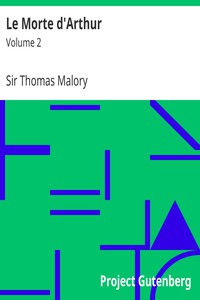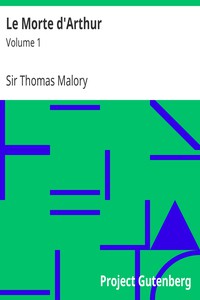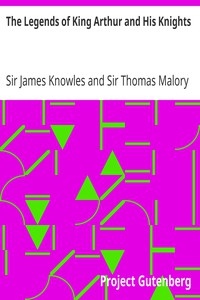Le Morte d'Arthur: Volume 2, Sir Thomas Malory [best pdf reader for ebooks .TXT] 📗

- Author: Sir Thomas Malory
Book online «Le Morte d'Arthur: Volume 2, Sir Thomas Malory [best pdf reader for ebooks .TXT] 📗». Author Sir Thomas Malory
Then King Mark and Sir Dinadan rode forth a four leagues English, till that they came to a bridge where hoved a knight on horseback, armed and ready to joust. Lo, said Sir Dinadan unto King Mark, yonder hoveth a knight that will joust, for there shall none pass this bridge but he must joust with that knight. It is well, said King Mark, for this jousts falleth with thee. Sir Dinadan knew the knight well that he was a noble knight, and fain he would have jousted, but he had had liefer King Mark had jousted with him, but by no mean King Mark would not joust. Then Sir Dinadan might not refuse him in no manner. And then either dressed their spears and their shields, and smote together, so that through fine force Sir Dinadan was smitten to the earth; and lightly he rose up and gat his horse, and required that knight to do battle with swords. And he answered and said: Fair knight, as at this time I may not have ado with you no more, for the custom of this passage is such. Then was Sir Dinadan passing wroth that he might not be revenged of that knight; and so he departed, and in no wise would that knight tell his name. But ever Sir Dinadan thought he should know him by his shield that it should be Sir Tor.
How King Mark mocked Sir Dinadan, and how they met with six knights of the Round Table.
So as they rode by the way King Mark then began to mock Sir Dinadan, and said: I weened you knights of the Table Round might not in no wise find their matches. Ye say well, said Sir Dinadan; as for you, on my life I call you none of the best knights; but sith ye have such a despite at me I require you to joust with me to prove my strength. Not so, said King Mark, for I will not have ado with you in no manner; but I require you of one thing, that when ye come to Arthur’s court discover not my name, for I am there so hated. It is shame to you, said Sir Dinadan, that ye govern you so shamefully; for I see by you ye are full of cowardice, and ye are a murderer, and that is the greatest shame that a knight may have; for never a knight being a murderer hath worship, nor never shall have; for I saw but late through my force ye would have slain Sir Berluse, a better knight than ye, or ever ye shall be, and more of prowess. Thus they rode forth talking till they came to a fair place, where stood a knight, and prayed them to take their lodging with him. So at the request of that knight they reposed them there, and made them well at ease, and had great cheer. For all errant-knights were welcome to him, and specially all those of Arthur’s court. Then Sir Dinadan demanded his host what was the knight’s name that kept the bridge. For what cause ask you it? said the host. For it is not long ago, said Sir Dinadan, sithen he gave me a fall. Ah, fair knight, said his host, thereof have ye no marvel, for he is a passing good knight, and his name is Sir Tor, the son of Aries le Vaysher. Ah, said Sir Dinadan, was that Sir Tor? for truly so ever me thought.
Right as they stood thus talking together they saw come riding to them over a plain six knights of the court of King Arthur, well armed at all points. And there by their shields Sir Dinadan knew them well. The first was the good knight Sir Uwaine, the son of King Uriens, the second was the noble knight Sir Brandiles, the third was Ozana le Cure Hardy, the fourth was Uwaine les Aventurous, the fifth was Sir Agravaine, the sixth Sir Mordred, brother to Sir Gawaine. When Sir Dinadan had seen these six knights he thought in himself he would bring King Mark by some wile to joust with one of them. And anon they took their horses and ran after these knights well a three mile English. Then was King Mark ware where they sat all six about a well, and ate and drank such meats as they had, and their horses walking and some tied, and their shields hung in divers places about them. Lo, said Sir Dinadan, yonder are knights-errant that will joust with us. God forbid, said King Mark, for they be six and we but two. As for that, said Sir Dinadan, let us not spare, for I will assay the foremost; and therewith he made him ready. When King Mark saw him do so, as fast as Sir Dinadan rode toward them, King Mark rode froward them with all his menial meiny. So when Sir Dinadan saw King Mark was gone, he set the spear out of the rest, and threw his shield upon his back, and came, riding to the fellowship of the Table Round. And anon Sir Uwaine knew Sir Dinadan, and welcomed him, and so did all his fellowship.
How the six knights sent Sir Dagonet to joust with King Mark, and how King Mark refused him.
And then they asked him of his adventures, and whether he had seen Sir Tristram or Sir Launcelot. So God me help, said Sir Dinadan, I saw none of them sithen I departed from Camelot. What knight is that, said Sir Brandiles, that so suddenly departed from you, and rode over yonder field? Sir, said he, it was a knight of Cornwall, and the most horrible coward that ever bestrode horse. What is his name? said all these knights. I wot not, said Sir Dinadan. So when they had reposed them, and spoken together, they took their horses and rode to a castle where dwelt an old knight that made all knights-errant good cheer. Then in the meanwhile that they were talking came into the castle Sir Griflet le Fise de Dieu, and there was he welcome; and they all asked him whether he had seen Sir Launcelot or Sir Tristram. Sirs, he answered, I saw him not sithen he departed from Camelot. So as Sir Dinadan walked and beheld the castle, thereby in a chamber he espied King Mark, and then he rebuked him, and asked him why he departed so. Sir, said he, for I durst not abide because they were so many. But how escaped ye? said King Mark. Sir, said Sir Dinadan, they were better friends than I weened they had been. Who is captain of that fellowship? said the king. Then for to fear him Sir Dinadan said that it was Sir Launcelot. O Jesu, said the king, might I know Sir Launcelot by his shield? Yea, said Dinadan, for he beareth a shield of silver and black bends. All this he said to fear the king, for Sir Launcelot was not in his fellowship. Now I pray you, said King Mark, that ye will ride in my fellowship. That is me loath to do, said Sir Dinadan, because ye forsook my fellowship.
Right so Sir Dinadan went from King Mark, and went to his own fellowship; and so they mounted upon their horses, and rode on their ways, and talked of the Cornish knight, for Dinadan told them that he was in the castle where they were lodged. It is well said, said Sir Griflet, for here have I brought Sir Dagonet, King Arthur’s fool, that is the best fellow and the merriest in the world. Will ye do well? said Sir Dinadan: I have told the Cornish knight that here is Sir Launcelot, and the Cornish knight asked me what shield he bare. Truly, I told him that he bare the same shield that Sir Mordred beareth. Will ye do well? said Sir Mordred; I am hurt and may not well bear my shield nor harness, and therefore put my shield and my harness upon Sir Dagonet, and let him set upon the Cornish knight. That shall be done, said Sir Dagonet, by my faith. Then anon was Dagonet armed him in Mordred’s harness and his shield, and he was set on a great horse, and a spear in his hand. Now, said Dagonet, shew me the knight, and I trow I shall bear him down. So all these knights rode to a woodside, and abode till King Mark came by the way. Then they put forth Sir Dagonet, and he came on all the while his horse might run, straight upon King Mark. And when he came nigh King Mark, he cried as he were wood, and said: Keep thee, knight of Cornwall, for I will slay thee. Anon, as King Mark beheld his shield, he said to himself: Yonder is Sir Launcelot; alas, now am I destroyed; and therewithal he made his horse to run as fast as it might through thick and thin. And ever Sir Dagonet followed after King Mark, crying and rating him as a wood man, through a great forest. When Sir Uwaine and Sir Brandiles saw Dagonet so chase King Mark, they laughed all as they were wood. And then they took their horses, and rode after to see how Sir Dagonet sped, for they would not for no good that Sir Dagonet were shent, for King Arthur loved him passing well, and made him knight with his own hands. And at every tournament he began to make King Arthur to laugh. Then the knights rode here and there, crying and chasing after King Mark, that all the forest rang of the noise.
How Sir Palomides by adventure met King Mark flying, and how he overthrew Dagonet and other knights.
So King Mark rode by fortune by a well, in the way where stood a knight-errant on horseback, armed at all points, with a great spear in his hand. And when he saw King Mark coming flying he said: Knight, return again for shame and stand with me, and I shall be thy warrant. Ah, fair knight, said King Mark, let me pass, for yonder cometh after me the best knight of the world, with the black bended shield. Fie, for shame, said the knight, he is none of the worthy knights, and if he were Sir Launcelot or Sir Tristram I should not doubt to meet the better of them both. When King Mark heard him say that word, he turned his horse and abode by him. And then that strong knight bare a spear to Dagonet, and smote him so sore that he bare him over his horse’s tail, and nigh he had broken his neck. And anon after him came Sir Brandiles, and when he saw Dagonet have that fall he was passing wroth, and cried: Keep thee, knight, and so they hurtled together wonder sore. But the knight smote Sir Brandiles so sore that he went to the earth, horse and man. Sir Uwaine came after and saw all this. Jesu, said he, yonder is a strong knight. And then they feutred their spears, and this knight came so eagerly that he smote down Sir Uwaine. Then came Ozana with the hardy heart, and he was smitten down. Now, said Sir Griflet, by my counsel let us send to yonder errant-knight, and wit whether he be of Arthur’s court, for as I deem it is Sir Lamorak de Galis. So they sent unto him, and prayed the strange knight to tell his name, and whether he were of Arthur’s court or not. As for my name they shall not wit, but tell them I am a knight-errant as they are, and let them wit that I am no knight of King Arthur’s court; and so the squire rode again unto them and told them his answer of him. By my head, said Sir Agravaine, he is one of





Comments (0)